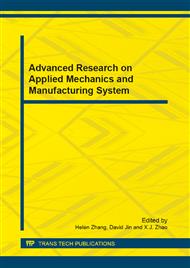[1]
Cao Zhijun. Analysis on rolling planning and scheduling algorithm and study on complex product flow scheduling problem. Shanghai Jiaotong University, 2004.
Google Scholar
[2]
Sundararaghavan P, Kunnathur A, Viswanathan I.Minimizing make span in parallel flow shop. Opns Res Soc, 1997(48): 834-842.
DOI: 10.1038/sj.jors.2600408
Google Scholar
[3]
WEI Wengao, JIANG Zhenzhen, YU Xiang. Research and simulation on flow-shop scheduling problem based on improved genetic algorithm. Equip Manufacturing Technology. 2011(2):10-12.
Google Scholar
[4]
S. Crawford, VC. S. Wiers. From anecdotes to theory: a review of existing knowledge on human factors of Planning and scheduling. Eds. London. 2001.26(9):15-43
Google Scholar
[5]
YANRADEEP. Application of optimized production technology in a capacity constrained flow shop: a Case study in automotive factory. Computers Industrial Engineering. 2003.27(2):217-220
DOI: 10.1016/0360-8352(94)90274-7
Google Scholar
[6]
Jung Soonchul, Moon Byung-Ro. Toward minimal restriction of genetic encoding and crossovers for the two-dimensional Euclidean TSP. IEEE Transactions on Evolutionary Computation, 2002, 6(6); 557-565
DOI: 10.1109/tevc.2002.804321
Google Scholar
[7]
Fatih Tasgetiren M, Pan Quan-Ke, Suganthan P N, et al. A discrete differential evolution algorithm for the no-wait flowshop scheduling problem with total flow time criterion. Proceedings of the 2007 IEEE Symposium on Computational Intelligence in Scheduling. New York, USA: ACM, 2007: 251-258.
DOI: 10.1109/scis.2007.367698
Google Scholar
[8]
Rajendran C, Ziegler H. Ant colony algorithms for permutation flowshop scheduling to minimize make span/total flow time of job. European Journal of Operational Research,2004, 155: 426-438.
DOI: 10.1016/s0377-2217(02)00908-6
Google Scholar


